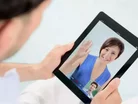Video Calls Facilitate Patient / Doctor Communication

Written by Ken Anders, Chief Operating Officer, TransPerfect Remote Interpreting
For the millions of Americans whose native language isn’t English, advocating for quality healthcare is a significant challenge. In an increasingly multilingual world, doctors, nurses and caregivers struggle to communicate with non-English-speaking patients. Previously, many hospitals and clinics employed on-site language interpretation experts, but due to budget cuts and the diversity of languages spoken, this is not always an option.
What if doctors could use a tablet or a webcam with a simple Web browser to communicate with patients? This is not just a concept; it’s a reality. Easy-to-use technology now allows caregivers to sync with live language specialists (available 24/7 in languages including American Sign Language) to facilitate real-time, accurate video communication. Why video? Language specialists believe that a skilled interpreter who can see the patient and understand his culture and facial expressions can pick up on visual as well as audio cues to determine things like the patient’s level of pain, cultural inhibitions, and many other clues that can help healthcare pros give the best possible care.
This method also addresses specific cultural barriers that may prevent a person from seeking medical attention. For example, in some Asian and Middle Eastern cultures, male patients are prohibited from being in a room alone with, or being touched by, female healthcare professionals. Improved communications technology is shrinking the communications gap for hospitals on a quest to serve limited English proficiency (LEP) patients.
As electronic records continue to proliferate, providers can use mobile devices to see the records of the person they're about to examine and quickly understand that the patient not a fluent English speaker. When they see this, caregivers can push a button and automatically connect to a video conferencing service. Instead of losing valuable time waiting for a translator to arrive, or trying to hunt down a phone number and dial in to a service, Internet-based language services can be contacted nearly instantaneously, unlike older models of translation services, which were more cumbersome and time consuming. Internet-based interpretation provides speed of access with one touch, allowing physicians to see more patients.
As a result, LEP patients are receiving better care.In many ways, it's like being in the same room with someone who speaks their language. Physicians can dig a little deeper and make sure the person is getting the care she needs. With more and more care being provided by specialists, it is important for vital pieces of patient information to be identified and shared between physicians. For example, a dermatologist can see what his patient’s cardiologist diagnose or prescribes, and then make sure that no conflicting medications are being administered. In healthcare, physicians often must rely on what the patient tells them, so the best information that providers can get via state-of-the-art quality translation services, the better care they can provide.



